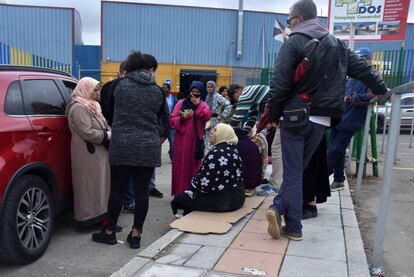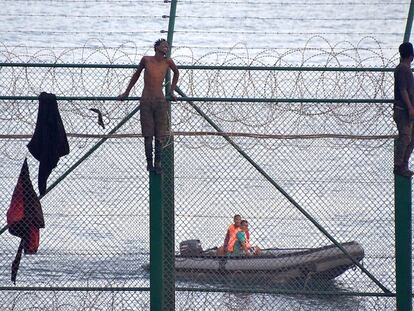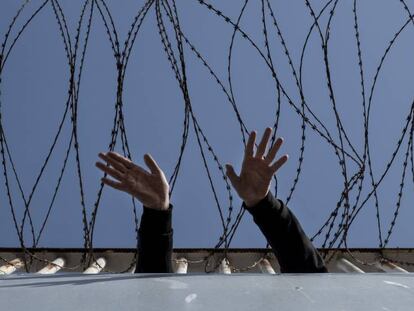Smuggling crackdown on Ceuta border leaves porter women in crisis
The decision to clamp down on the illicit traffic of goods from the Spanish exclave city to Morocco is being described as an economic disaster for people on both sides of the crossing


¡°If you stop for just one day, you die. And we¡¯ve been out of work for two months. We¡¯re not even eating, but we need to try. And we can¡¯t complain, either. The men go to jail and the women scream, but it doesn¡¯t make any difference,¡± says an angry Amal, before putting on five layers of clothes and attempting to cross back into Morocco from the Spanish exclave city of Ceuta.
Together with Amal, a dozen other women who work as porters, wait their turn to cover their bodies with sweatshirts and blankets that they will try to smuggle across the border. ¡°They say they are hungry, desperate,¡± says Amal in perfect Spanish, which she learned after 25 years in the trade.
Some people beat us and others take away what we¡¯re carrying, but we¡¯ve got to try
Rahma, porter
In all that time, Amal cannot remember a more desperate situation than the one she finds herself in now. Two months ago, Morocco and Spain cracked down on the illicit traffic of goods across the Tarajal border. The move affects items brought into Morocco from Ceuta both by car and on foot, as these Moroccan women who carry large bundles on their backs do.
The situation is not new for Melilla, Spain¡¯s other city in northern Africa, where Morocco ended porter activities in September 2018.
The Confederation of Entrepreneurs of Ceuta (CEC) has defined this latest decision as ¡°an economic disaster for both sides.¡±
The only hope for these porters is the cryptic statement made on Thursday by Hassan Abyaba, the Moroccan government spokesman, who said that the situation ¡°will go back to normal as soon as possible.¡±
While Amal and her colleagues attach clothing to their bodies in Tarajal, a waiter who calls himself Omar sums up the situation: ¡°We are in crisis.¡±
There are hardly any patrons at his fish restaurant in downtown Fnideq in northern Morocco, which has a population of 77,000. The stands at the market square still offer cookies, detergent and yogurt brought in from Spain, but there are no buyers in a place that used to be a hive of activity. ¡°The government has taken it all away from us. There is no money, and nobody can spend anything,¡± explains Omar.
Many are going back to their home towns. They came here to work, but there is nothing now
Omar, waiter
A little over two years ago, as many as 9,000 female porters and 10,000 cars used to make a living from this ¡°atypical commerce,¡± as it is euphemistically known. The trade represents more than 50% of what Ceuta imports from peninsular Spain. Although there are no official figures, Professor Jos¨¦ Aureliano Mart¨ªn figures that goods worth around €500 million imported by Ceuta in 2018 ended up in Morocco.
¡°Morocco¡¯s GDP has been growing for years; it was €100.4 billion in 2018 compared with €63.2 billion in 2008, and we predicted that porter activities would eventually disappear,¡± says Mart¨ªn.
The restrictions began around two years ago, when Morocco and Spain created a specific crossing point for porters, Tarajal II, where authorities began checking the size of the bundles and the goods that were passing through. ¡°There are wholesalers who experienced 30 to 40% drops in sales,¡± says CEC secretary Antonio Ram¨ªrez.
Nobody knows for sure what led to the decision or who took the first step. ¡°At a border, it is difficult to make a unilateral decision. This is a border control issue, and from the point of view of human rights it was barbaric,¡± says a source at the Spanish police, alluding to the heavy weight of the packages carried by these women. Around 10 female porters have died in the last two years after being crushed in stampedes.
The CEC believes it was Morocco that decided to crack down on the irregular trade. ¡°Morocco is not interested in projecting a Third World image; it wants to sell itself as a country that is modernizing,¡± said another Spanish source.
The decision is having a ripple effect in many sectors, including transportation. Ram¨ªrez is forecasting sharp drops in the IPSI, an indirect tax on goods, as well as port duties and sales, all of which will ¡°trigger firings and readjustments¡± in Ceuta, a city of 85,200 people where unemployment is already above 25%.
In Morocco, the situation does not look much better. Tangier, T¨¦touan, Fnideq, R¨ªo Mart¨ªn and Rinc¨®n are bearing the brunt of the crackdown. These border towns benefit from a visa-free arrangement under the Schengen Treaty, making it easier for locally registered residents to cross into Spanish territory.
¡°Many are going back to their home towns. They came here to work, but there is nothing now,¡± says Omar, who attempted the sea journey across the Strait of Gibraltar a year ago, but was returned to Morocco as soon as he landed on the Spanish coast.
Rahma, a 28-year-old woman from Fnideq with four children, says she has lost hope. ¡°I don¡¯t even have enough to pay the rent. We used to earn €25, now we are making €5 or €6 for whatever few things we manage to get across,¡± she explains through an interpreter.
Another porter says she has not paid her electricity or water bills for two months. ¡°Some people beat us and others take away what we¡¯re carrying, but we¡¯ve got to try, I barely have enough to eat,¡± she says, concealing a sweatshirt under layers of clothes in the hope of getting it across the border and earning a few dirhams.
The crackdown has also created a political crisis that is proving difficult to handle. The Spanish government delegate¡¯s office in Ceuta has made no statements for several days, other than to say that Morocco has not officially communicated the border shutdown against porters. Morocco¡¯s promise to reopen it ¡°as soon as possible¡± has been confirmed by Spanish government sources.
English version by Susana Urra.
Tu suscripci¨®n se est¨¢ usando en otro dispositivo
?Quieres a?adir otro usuario a tu suscripci¨®n?
Si contin¨²as leyendo en este dispositivo, no se podr¨¢ leer en el otro.
FlechaTu suscripci¨®n se est¨¢ usando en otro dispositivo y solo puedes acceder a EL PA?S desde un dispositivo a la vez.
Si quieres compartir tu cuenta, cambia tu suscripci¨®n a la modalidad Premium, as¨ª podr¨¢s a?adir otro usuario. Cada uno acceder¨¢ con su propia cuenta de email, lo que os permitir¨¢ personalizar vuestra experiencia en EL PA?S.
En el caso de no saber qui¨¦n est¨¢ usando tu cuenta, te recomendamos cambiar tu contrase?a aqu¨ª.
Si decides continuar compartiendo tu cuenta, este mensaje se mostrar¨¢ en tu dispositivo y en el de la otra persona que est¨¢ usando tu cuenta de forma indefinida, afectando a tu experiencia de lectura. Puedes consultar aqu¨ª los t¨¦rminos y condiciones de la suscripci¨®n digital.










































